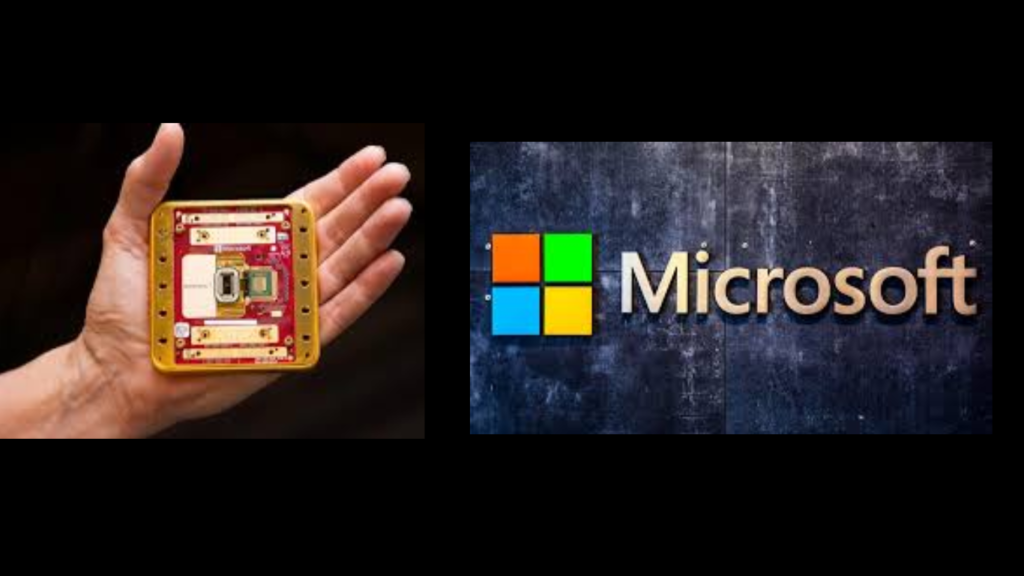Microsoft’s Impossible Quantum Chip: The Future of Computing?

Introduction
Microsoft has just announced a groundbreaking quantum computing chip named “Majorana One”, which they claim to be based on an entirely new state of matter. If this claim holds true, it could revolutionize quantum computing and push us into an era where computers operate at billions of times the speed of today’s machines.
In this blog, we will break down the crazy science behind Majorana One, how it compares to traditional quantum computers, and whether this new topological superconductor could finally make quantum computing practical.
1. What Is Majorana One and Why Is It Important?
Microsoft claims that Majorana One is not just another quantum chip – it’s a fundamental breakthrough in physics. They say it’s based on a new state of matter, a topological superconductor, which could solve some of the biggest challenges in quantum computing today.
Why Does It Matter?
- Quantum computing has major roadblocks like high error rates and instability.
- Current quantum computers are impractical for large-scale applications.
- If Microsoft’s claims are true, Majorana One could be the key to achieving stable, scalable, and practical quantum computing.
While traditional computers rely on bits (0s and 1s), quantum computers use qubits, which can exist in multiple states at once due to quantum mechanics. However, today’s quantum computers face an issue called decoherence, which leads to unstable and unreliable calculations.
Microsoft claims that Majorana One solves decoherence using a new quantum particle known as the Majorana fermion.
2. How Does Majorana One Work?
The Science Behind It
Microsoft’s chip is based on the Majorana fermion, a subatomic particle that was first predicted in 1937 and was only observed in 2020. Unlike regular particles, Majorana fermions are their own antiparticles, meaning they are incredibly stable and resistant to quantum interference.
How This Helps Quantum Computing
Traditional quantum computers use fragile qubits, which are easily disturbed by their environment, causing errors in calculations. Majorana One’s Majorana-based qubits are naturally protected from decoherence, making them far more stable and reliable.
- Standard Qubits: Unstable, need heavy error correction.
- Majorana Qubits: Resistant to errors, could scale up faster.
If Majorana One works as Microsoft claims, it could enable quantum processors to scale up to millions of qubits, which would be a game-changer for computing power.
3. What Makes Majorana One Different?
Microsoft’s Unique Approach
Most major companies, like Google and IBM, are pursuing superconducting qubits, which require massive cooling systems and error correction algorithms. Microsoft, however, is taking a radically different approach by focusing on topological qubits.
Key Differences:
| Feature | Traditional Quantum Chips | Majorana One |
|---|---|---|
| Qubit Type | Superconducting Qubits | Majorana Qubits |
| Stability | Prone to errors | Naturally stable |
| Error Correction | Requires heavy error correction | Minimal error correction needed |
| Scalability | Difficult to scale | Potential to scale to millions of qubits |
| Temperature | Requires near absolute zero | Also requires extreme cooling |
By focusing on Majorana-based qubits, Microsoft aims to develop a quantum processor that is far more robust, scalable, and efficient than anything we have today.
4. The Potential of Quantum Computing
If Majorana One delivers on its promises, quantum computers could unlock incredible advancements in various fields, including:
1. Medicine & Drug Discovery
Quantum computers can simulate molecular structures at an atomic level, leading to faster drug discovery and cures for diseases.
2. AI and Machine Learning
AI models require massive computational power. Quantum computing could train AI models in seconds instead of months.
3. Climate and Weather Predictions
With ultra-fast calculations, we could build more accurate climate models and predict extreme weather events.
4. Cryptography & Cybersecurity
Quantum computers could break existing encryption methods, forcing us to create new quantum-resistant security systems.
5. Is Microsoft Leading the Quantum Race?
While Microsoft’s topological quantum computing approach is unique, Google and IBM are currently ahead in terms of practical quantum computing.
Current Quantum Computing Leaders:
- Google: Developed the Willow chip, which achieved a significant milestone in quantum error correction.
- IBM: Has a working 127-qubit processor and plans to scale beyond 1000 qubits.
- Microsoft: Still in early stages, but claims Majorana One can scale millions of qubits.
While Microsoft has the most ambitious long-term plan, Google and IBM currently have more working quantum computers. However, if Majorana One proves to be scalable, Microsoft could leapfrog the competition in the coming years.
6. FAQs About Majorana One and Quantum Computing
1. What is Majorana One?
It is Microsoft’s new quantum chip based on Majorana fermions, a new state of matter that could revolutionize quantum computing.
2. Why is Majorana One important?
It could solve the biggest problem in quantum computing – decoherence, making quantum computers far more stable and scalable.
3. How is Majorana One different from Google’s quantum chip?
Google uses superconducting qubits, which require error correction, while Microsoft’s topological qubits are naturally stable and require less error correction.
4. When will Majorana One be available?
Microsoft has not provided an exact timeline, but if successful, it could be commercialized within the next decade.
5. Will quantum computers replace traditional computers?
Not entirely. Quantum computers will be used for specialized tasks, such as AI, drug discovery, and cryptography, but traditional computers will still be needed for everyday tasks.